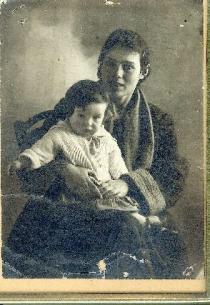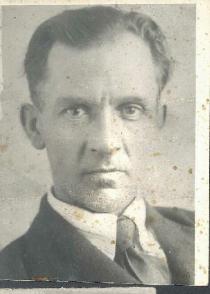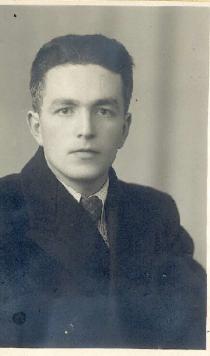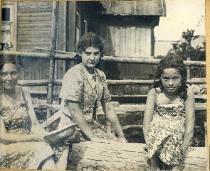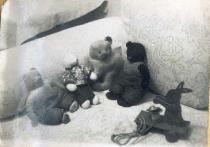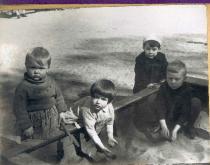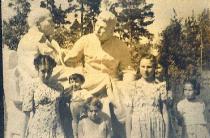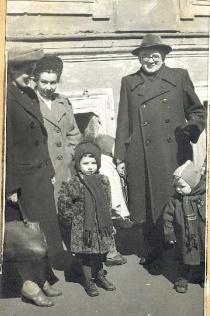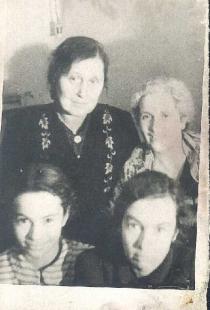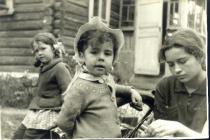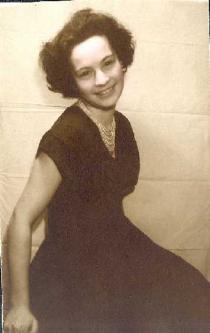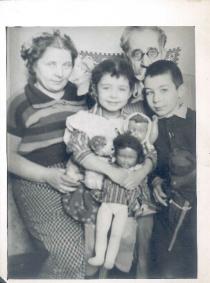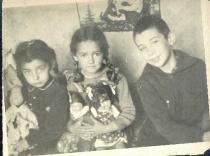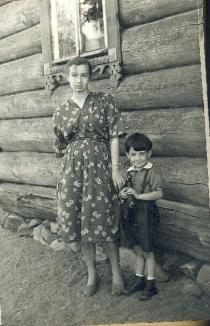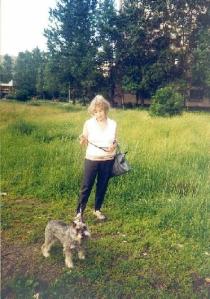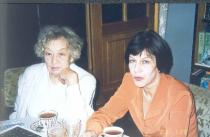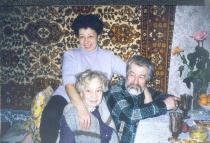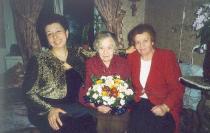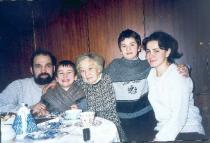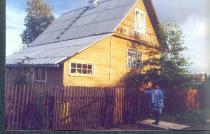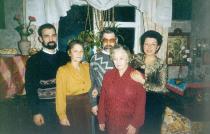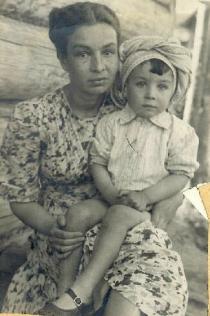
Rita Razumovskaya
St. Petersburg
Russia
Interviewer: Nika Parhomovskaya
Date of interview: November 2003
Rita Semenovna Razumovskaya is an active and positive-minded woman. Her laugh is so sincere, that you want to laugh together with her. Despite of that she had quite a hard life: the Great Terror 1, the Leningrad Blockade 2, the death of her husband, and responsibility for the children, whom she had to raise alone, and when those children were grown up, besides all the usual house chores she had to give her time to numerous pets. Nowadays Rita Semenovna lives together with her daughter Olga and three cats in an excellent three-room apartment. However, despite her age, you can catch her at home very seldom: she frequently goes to concerts, to museums and visits her friends.
Life under the communist regime
My family
My maternal great-grandmother was called Zlata Naumovna Bam, first she married some Strunsky and took his name, and later she married some Troinin, who was living in Moscow. There were rumors that he wasn’t her husband legally, and after all, he was her relative. Anyway, the family name Troinin is a famous Jewish family name. His brother was some big shot, a politician, at a time when there was no such anti-Semitism in Russia.
So she had two husbands. Grandmother’s father was the first one; he was called Strunsky. I don’t know where my great-grandmother lived together with Great-grandfather Strunsky, perhaps, in some Jewish borough. I didn’t meet either one of her husbands, but I remember her very well, because she lived with my family on Vasilievski Island, on Siezdovsksaya line, in the house number 27, apartment 20. She was pretty old, and I was surprised how she could keep all her beauty, even though she was more than 80 years old. She was tall, stately, gorgeous, powerful and not kind at all. She didn’t like little children, including us, her great-grandchildren. She was interested only in our origins: she liked that we were nice and gifted, and since I was very slim and strong, she always pinched me and said, ‘Here you can see our roots!’
I don’t know anything about my great-grandfather Strunsky, but my great-grandmother was very religious. I remember her always praying: she put on some special traditional cloth; I don’t know what it was. In the cupboard she always had matzot, and we, the children, stole it, both because we liked matzah and also because we wanted to see what our great-grandmother would do. Also she read some Jewish book all the time, and we understood nothing in it. She spoke Yiddish more than Russian. And, thanks to her, I still remember some Yiddish expressions.
I know that my great-grandmother and great-grandfather on the side of my mother’s father, the Perels, were quite rich people. I heard a legend that in the bathroom they had golden seats on the toilet, because they were so rich! But I don’t know when, where and doing what kind of things, they became so rich. I don’t think that they were merchants. Maybe, they lent people money, because nobody mentioned any profession. They were not people who produced anything. They made money from money. Long before the [Russian] Revolution 3 they ruined themselves, and my mother’s father, Efim Perel, lost all their money, playing cards, and after it happened, he killed himself. He died very young.
Granny wasn’t like my great-grandmother, her mom, she was completely different. Grandmother was very small, she didn’t even reach my ear, and she was very merry, easy-going, an impossible coquette. I remember that even when she retired, she used lipstick. She always had her own life, as a young woman, she found herself in an artists and actors’ circle, she was friends with Shalyapin 4, and he carried her on his shoulders and called her ‘my little humming-bird.’
At home Grandmother was called Bertha Lvovna Perel 5, and her Jewish name was Beila Leibovna. And my mother had a document, where she was called so: ‘Sima – Serafima, daughter of Chaim – Efim, Shmaim – Semen Perel’. So I translated this text in the following way: Sima [Serafima] – that is my mother’s name. Daughter of Chaim [Efim] – her patronymic was Efimovna. And Semen – that was the name of her grandfather, my paternal great-grandfather.
Mother never saw her father. He was a passionate gambler and killed himself just the same year my mother was born. He was my grandmother’s first husband, and when he died, she married a singer, who sang together with Shalyapin. His name was Zakhar Matsin, and Grandmother had a double family name: Perel-Matsin. Matsin was a friend of Dvoritchin, who ‘worked’ together with Shalyapin – he was some kind of manager, and Grandmother was in this company too. But she didn’t understand anything of music, not at all. In any case, she was a curious woman, and they just had fun with her. I mean that they liked to spend time with her, to relax together and have fun.
She said that she got married at the age of sixteen. I don’t think this was true… I know that all her life she concealed her real age. Sometimes she said that she gave birth to my mother as a fourteen-year-old girl, and sometimes confessed that she was almost sixteen then. So you could never find out the truth. I think, that everything was normal, and she gave birth to her child just like the others did, as a twenty-year-old woman. So due to my grandmother’s reserved character they wrote on her grave some absolutely false dates. If you believed them, you would think that she gave birth to my mother at the age of ten, or something like that. My grandmother was buried at the Jewish cemetery called Preobrazhenskoe. My younger sister still takes care of the grave and the tomb. And the grave, though pitiful now, is preserved.
Grandmother happened to find herself in Petersburg [later Petrograd, Leningrad, today St. Petersburg] very easily. She was a doctor, a dentist, because Jews usually became dentists, or medical attendants and midwives. It seems to me, that doctors were allowed to live outside of the Pale of Settlement 6, including Petersburg. So she worked as a dentist all her life. She differed from others, because she could pull out teeth very well. And everyone knew her because of this skill. Even though she was a very small woman, she could do it deftly and without any pain. And it is remarkable that she became a dentist, a doctor, because it was quite unusual for women to become doctors!
Grandmother was an only child, which was rare for a Jewish family. Apparently, there were no ‘Jewish features’ – in the traditional meaning of this phrase – in her nature and character, she was completely Russified. She didn’t know any Yiddish, absolutely none at all. And she never wore Jewish clothes. She didn’t observe any traditions or go to the synagogue.
My mother was never told anything about her father; she and my grandmother didn’t like to talk about him. Maybe, the reason was that he played cards and lost all his fortune… They said only that he was an idler and killed himself at a very young age.
As for my father’s mother, Rebecca Kiselgof, I must say that I never saw her, because she died of tuberculosis as a young woman. My paternal grandmother was a ‘shinkarka’; she kept a ‘shinok’ [‘tavern’ in Russian] somewhere near Vitebsk [today Belarus]. That was even before the [Russian] Revolution. I know only that Grandfather Aron Kiselgof was much older than she, however, I have no idea what he was, perhaps, he was a craftsman or maybe he helped his wife to run this tavern.
I saw my paternal grandfather once in my entire life, when he came to Leningrad a long time before the Great Patriotic War 7. I don’t know where he came from, I was very little then, I was only seven or eight years old. I had just started school. I remember him quite vaguely, but, of course, he shocked me with his unusual appearance. That was a real Jew, as if he’d just stepped out of Dürer’s engravings [Dürer, Albrecht (1471-1528): famous German engraver, painter and mathematician]. He was in payes, very handsome and striking.
To tell the truth, I heard rumors that he wasn’t the real father of my father. The wife of one of my father’s brothers, Zinovy, said that my father was a bastard, and it was a big family secret. Nobody knew about it, and just before Guta Grigorievna died she told us about it, because Zinovy was dead already. Anyway, Grandfather died before the Great Patriotic War started. I know nothing about my grandfather’s brothers and sisters. But I guess they had a big family in Belarus.
I know that my father, Semen Aronovich Kiselgof, was born not far from Vitebsk, in Babinovichi [a borough in Vitebsk province], and that he was born in 1893. Father was a child, when his mother died. And his elder brother, Zinovy Kiselgof, lived in Petersburg, he was seventeen years older. So Father moved to Petersburg before the [October] Revolution, and Zinovy raised him and even replaced a father for him.
My father played the violin, he graduated from the Conservatoire with excellent grades. At home we had violins made by Amati [famous Italian violin maker of the 17th century], Father played them and I still remember him playing. He played mainly classics, he liked to play Paganini [Niccolò (1782-1840): Italian virtuoso and composer of the 19th century], and as a matter of fact he had quite a large repertoire.
My parents could have got to know each other only in Piter [common name for Petersburg]. They got to know each other after the Revolution, but they never told me when exactly they met. I know only that they knew each other not very long, only half a year, before they got married. Mother told me how he proposed to her: ‘Simocka [short and tender name for Serafima], let’s live together!’ I guess that they were from the same circle and both were very virtuous. They got married in 1921, and I don’t think that there was a wedding ceremony, either Jewish, or Russian. They just registered their relations officially, since they were very poor.
My mother was born in 1897. She graduated from a gymnasium [high school] with some medal: either gold, or silver [a distinction]. She not only told me about her school, she even showed me its building. This school was situated on Petrograd side, on Bolshoy Avenue, between Grebezkaya Street and Lev Tolstoy square. It used to be a famous gymnasium, located in a three-story house of a pale yellow color. She told me that they studied foreign languages a lot, and her friend Julia Vladimirovna Shishova spoke wonderful French, while my mother understood it, but never spoke it, because she didn’t have enough practice. At this gymnasium many girls from quite noble families studied, however, there were some Jews in their class too, and they didn’t go to Christian lessons [they taught Russian Orthodox religion in pre-revolutionary schools].
Mother grew up in the house of her stepfather, whom she hated very much. She was afraid of him so much, because he tried to molest her, even though she was just a little girl and, finally, she had to leave her home. I don’t know if her mother knew about it, maybe she guessed.
After the Revolution they proved to my father, that the winning proletariat doesn’t need any art, it needs economics instead, and so he began to learn the new profession in some of Leningrad Institute, and became an engineer/economist. That’s why he had two university degrees. But I remember that when I was ten or twelve, he still played the violin in the cinema, which was situated on Sredny Avenue of Vasilievski Island, later it housed some club named after Uritsky [a revolutionary, killed in Petrograd in 1918], and today the Theater of Satire is situated there. Probably, he studied at some extra-mural courses, and then he began to work at ‘Mechanobr’ [big factory in Leningrad]. He didn’t play the violin any more and worked as an engineer five or six years before World War II started.
My mother was absolutely non-musical, she didn’t have a good ear for music, and I’m just the same. But I inherited the love for music from my father. At home he played frequently, and my mother didn’t ever protest. But when my mother started to rock the children to sleep, he always shouted: ‘Sima, don’t sing!’ She sang completely wrong, out of tune.
There was nothing Jewish in my father’s character, and probably due to this reason his relatives thought that his father wasn’t Jewish. I can’t guarantee this for sure, and, to be honest, it is none of my business; I’m absolutely indifferent to this fact. Father was very silent, shy, and he loved fishing. As a matter of fact, he was quite a handsome man, women liked him, but he wasn’t a playboy, and didn’t pay attention to them. As a father, he was very tender; he pampered my younger sisters and had wonderful relations with my mother. Mother was very clever, a very reserved and closed person. And, just like Dad, she was unjust: she could love unworthy people, but without any reason, without any explanation, for example she didn’t like my friend, and that was it. She had unreasonable loves and affections.
Mother taught Russian and literature. She graduated from the History and Philology Faculty of Leningrad University, she studied after the Revolution, and she finished her studies when I was little. Mother was a teacher her entire life, first, it seems to me, in a regular school, and later only in an evening one.
Mother did everything very diligently. When she started to do something, she learned very diligently and studied this new issue for a while, and then, finally, she could do it! Anyway, she was one of those people, who have ‘bad hands.’ She couldn’t sew; she poked the needle wherever it was possible. And Father, on the contrary, was very practical, despite the fact that he was a musician. So my mother never learned to sew and darn.
She couldn’t choose the right clothes, although she was such a beauty! She considered this beauty her great misfortune. Her stepfather’s advances made such a strong impression, influenced her so much, that she was afraid of men, and thought that beauty was a sin, and after all she tried to convince me that I was ugly, because she didn’t want me to repeat her life. Of course, I wasn’t ugly, on the contrary, I was a very nice girl.
Mother was an only child, and Father had a brother and a sister. Father’s sister Elizabeth lived near Vitebsk, in Babinovichi. She was easy-going and liked to talk, she was very nice and had a wonderful voice, she sang very well. I saw her, because she came to visit her brothers in Leningrad – I think, she came twice or even three times. She was a doctor, and her husband was a doctor too, and they didn’t have children. They were religious people, Elizabeth sang Jewish songs, tried to keep kosher and observed Sabbath. I guess, they celebrated holidays and, perhaps, prayed everyday.
My father’s brother, Zinovy Kiselgof, in his youth played concertino and was busy with social work. My uncle was a member of the Bund 8, the organization, which became the base for the Communist Party. He lived in Petersburg almost his entire life, and I can’t guess, why the authorities let him live here, why they didn’t forbid that. After the Revolution he was headmaster of a Jewish boarding school on the Tenth line of Vasilievski Island. There they taught not only orphans, but also those, who didn’t live there and came to study only, because it was quite a famous school. Uncle, of course, wasn’t a Zionist in the real meaning of this word, he didn’t dream about the establishment of the Jewish State, but he supported the propaganda of Jewish culture. He lived in the school building; he had two rooms and a kitchen, where children were not allowed.
Uncle was married to sisters, Jewish sisters, naturally. And that happened due to the following reason: according to Jewish traditions, you can’t marry the younger sister, if the elder one isn’t married yet. So as a matter of fact he married the younger one, Rebecca, and officially he was registered with the elder sister, Guta Grigorievna. And then the younger sister died, and he stayed to live with the elder one.
They had a daughter, she was called Rosa, and she was mentally disabled. She had a nice childish face, but despite of this, she was a complete fool, she frequently sat and sorted cereals. She didn’t live very long; she died at the age of eighteen. And the younger sister, the beautiful one, gave birth to another daughter: Ludmila – Jewish name Lea. She was normal, but very pampered and full of feeling of self-appreciation, and all her life she was busy in the field of social work only.
First my parents lived on the Petrogradskaya side, on Grebetskaya Street, and there I was born. We lived there all together: me, Dad, Mom and Granny. Later my great-grandmother came to live with us too. But in 1924, when I was two and when the flood [the very last famous flood in the city, many inhabitants and buildings suffered from it] happened, we moved to Vasilievski Island. I remember this flood very well. I wasn’t frightened, but we ran home – together with Mom or the baby-sitter – we found out that we were the last ones. On our gates there were such chains, and the ‘dvornik’ [the man, who takes care of the yard] closed them the moment we arrived.
Anyway, this flat on the Petrogradskaya side was quite dark, and in 1924 we moved to the house on the corner of Siezdovskaya line and Sredny Avenue. Later there was a café on the first floor of this building for a long time, and above this café you could see the balcony, where I spent my entire youth. We lived in a huge communal apartment 9; as a matter of fact, those were two flats with different entrances, only the kitchen and the corridor were common. There was a very interesting staircase. This building was built at the end of the 18th century, and the stairs were built in the wall, almost as in ancient Orthodox churches, there were no stairwells. The stairs led to the gallery, paved with stone blocks just like the street. We also had huge windows, looking over the yard. When you stood on the third floor of this gallery, the angel from the Church of Saint Catherine [one of the oldest Catholic churches in Russia] seemed to be very near. I remember this angel with the cross from my early childhood.
We had three rooms. One of them was huge, something like thirty square meters. And the only entrance to the room, where I lived together with my sisters – it was about eighteen square meters – was from this huge first room. There was also a small room, my parents’ bedroom. Their windows went straight out on Sredny Avenue and there was a wonderful view out of those windows of the city, roofs of the buildings and the Neva River. The apartment was a very good one; my parents chose it on their own: in those times the authorities gave apartments for free. And Father liked this particular one. My granny lived in the large room; her part was separated off with shelves. She had her own place, and she didn’t let anybody in.
In the same apartment a worker’s family lived together with us. I don’t remember their family name, but I know that they all were sick with tuberculosis. And in some small room there lived Sonya Krivoshey, a former student of Zinovy Aronovich. She wasn’t quite normal [mentally], but she was very kind, and even during the blockade [of Leningrad] she was the only one, who gave her food to others. Finally she died of hunger.
Grandmother never invited her friends, and my great-grandmother didn’t either. Father’s male friends were not seen at our place either. Therefore my mother had friends over; her best friends were a Russian woman and a Jewish woman. They studied together with my mother in gymnasium, and later they frequently came to visit us. This Jewish woman lived in Moscow; her name was Frieda Davidovna Chernomordikova. In times of Lenin 10 she was the secretary in Smolny [building of Smolny Institute for noble girls, where during the Revolution the Bolshevik headquarters was located], and later she became a guide and a secretary of Shelgunov [one of the oldest members of the Communist Party], the blind Bolshevik. Frieda lived her entire life together with her brother and his family. She was a surprisingly kind person, she was very clever and kind, but she wasn’t used to everyday life. When she was old, she switched the primus [stove] on according to written instructions only. ‘Genya, where is my instruction?’ Genya, her brother, brought the instruction; she opened the paper, put on the glasses and began to read… The second friend, Julia, was a bit less intelligent, even though she was from a noble family. She washed me and was my tutor when I was a child and later she raised me.
Childhood
I was born in Leningrad on 20th March 1922. My parents first wanted to name me Rebecca after my grandmother [Father’s mother], but Mother said, ‘No, that isn’t a nice name, and there is no need to stress her Jewish nationality’ 11. So they decided to name me Rita, this wasn’t short for Margarita, this was the full name. And then for a while I had to explain to everyone that I’m only Rita, nothing more. My parents read this name in one of Ibsen’s 12 plays.
I went to the kindergarten, and this is the most terrifying memory of my childhood, that was such a horror! I was extremely shy, absolutely asocial, and I was afraid of my German teacher. As a result, I spoke German as well as Russian, absolutely fluently, but I cried, asked not to be left alone with her and sat in the corner, being angry, so my parents preferred to get me out of this kindergarten. Since this time they employed numerous baby-sitters. There were plenty of them, and they were changing all the time. Grandmother didn’t pay any attention to our upbringing, she continued both to work and participate in social activities. My parents worked a lot too, and to tell the truth, nobody raised me.
Among our amusements I remember how we drove ‘veikas.’ ‘Veiky’ are horses during the Pancake week, there is such a Russian tradition, more heathen than Russian Orthodox, and some ribbons were put into the horses’ manes. All that took place when I was a little girl.
I went to school at the age of eight, and I went to the Jewish school for three long years. They made fun of me there, because I was dressed awfully. The point was not that my parents had a bad taste or were poor. We were not a poor family. Mother worked two jobs, and Father earned money too, we had housekeepers, and we ate well, and it was quite cozy at home. We never had anything splendid, didn’t go to Torgsin stores 13, but we lived quite well. Of course, we borrowed money, everyone did, and sometimes the money was gone before the salary was paid, but it was so usual for those times that nobody was shocked by it.
No, the point was that my mother considered me very beautiful, however she always said that I wasn’t, she even called me ‘my ugly one’ or something like that. So they dressed me with the purpose to hide this beauty in some striped or checked trousers, and, coming to school, I hid them. There was a staircase, and near this staircase stood a trunk, under the stairs, but not close to the wall. I put those trousers far behind this trunk, so nobody could see them. And I remember this horror very well. And after all I was someone, who ‘came in’ and didn’t live with these pupils all the time. I mean they were staying there all the time and had a chance to make friends while I was coming from time to time only, and, perhaps, they were jealous of me because I had a family and home, and most of them were orphans.
Besides, I was the niece of Zinovy Aronovich, and his students were afraid of him to death, because he was a very strict and severe teacher. Everybody ate together, and I, as someone with privileges, was sent to the kitchen, where his wife fed me, not Rebecca, who never could do anything, but the other one [Guta], who was a very skillful housewife, she also tried to raise me. I was afraid both of this feeding and teaching, it was necessary to eat everything, and I couldn’t, and finally, when I came back from this kitchen, students would make fun of me and laugh.
At school we all studied Yiddish, and somehow all pupils spoke Russian with very strong Yiddish accents. So my parents decided that it would be hard for me to live in the USSR if I spoke with an accent. This was no good! And they transferred me to another school, on the Fifth line of Vasilievski Island. It was the former famous gymnasium Schaffe, they taught German over there, and since I spoke with a strong Yiddish accent, the German teacher hated me. I got bad grades for German, even though I knew this language no worse than my classmates. Then this German teacher left, and another one came and she started to give me excellent grades and called me the ‘tail of a comet,’ meaning that I was at the tail, in the shadow of the best pupils. Finally this was the school where I graduated from.
At school we learned Russian, Literature, Mathematics, Physics, Chemistry, German and Geography. There we had even Astronomy lessons and our astronomy teacher was Maria Abramovna Linnik, a Jew. Her husband was a world-famous scientist, academician, and their daughter studied in our grade too. I was friends with her for a while, I’ve been to their place, and later she helped me to find a job at the Hermitage. Then History was my favorite subject. Our history teacher was Olga Grigorievna, she had graduated from the Sorbonne [Paris University] long ago, she was an intellectual woman, and her origins were among Petersburg pre-revolutionary noblemen. She taught in a very interesting way, very well. For a while I was friends with her daughter Tatiana, even though it was more competition than usual friendship.
I also had a very good friend called Irina [Ludvigovna Knaut], but Tatiana for no reason became jealous about this friendship and started to break us up. And finally she succeeded, and we didn’t communicate for many years. By the way, Irina later took care of our history teacher, Tatiana’s mother, when she became old and sick. And it took for her quite a while to understand who Tatiana was, what she was. And I understood it much earlier and stopped any relations with her.
Apparently, I had many friends, I even had a boyfriend in the tenth grade [last grade in Soviet school], Alexander Guriev, nowadays he looks very old. And even though I was very unsociable, I had to communicate on some business and friendships started. I had the nickname ‘the ambulance’; maybe I had many friends due to this reason. I didn’t pay any attention, if they were Jews or not. I didn’t even think about this question, and I had no interest in this topic.
In my free time I read. Read, read, read… And now I continue to do the same, thank God, I still have good eyes. Father didn’t read too much, and Mother was keen on reading. She read more because of her job, mostly Russian classics, and she was a good teacher, very methodical and pedantic. As for me, I liked Dickens most of all, and my favorite book was ‘The Life and Adventures of Nicholas Nickleby.’ When I was reading this book, I decided that my husband should be called Nicholas too. So it happened. I also liked Mayne Reid, Jules Verne, and I read a lot about various adventures. I didn’t like love stories; they even made me angry.
I wanted to study music very much, but my dad didn’t want that. He said, ‘Your ears aren’t good enough for music.’ Even though I’m able to distinguish human voices, I can distinguish the play of one violinist from the play of another, and I can even differentiate between some conductors, which I know well. Anyway, obviously I have an interest in music and I get strong emotional impressions from the music I listen to. In my childhood, when guests came to visit – and at home they loved to celebrate children’s birthdays – Father amazed the children, he played the violin for us, and I remember us dancing, accompanied by his playing.
When I studied at school, I danced very well. I had been naturally given grace, I had good proportions, and my uncle wished to make a ballerina out of me. So he tried to prove to my father that I was very small, very light, but Father insisted on his own point of view. Dad thought that the winning proletariat needs economics, and he, the violin player, isn’t needed, so I won’t be needed, as a ballerina. Later the same uncle decided that I should be a writer and a poet. Who didn’t write poems, being young? I did too. So my parents tried to convince me to apply for philology, and I was keen on history, perhaps, not history itself, but archeology. I was interested in excavations, so-called ‘field work.’ When I was in the fifth grade, my parents put me in the group of art lovers, attached to the Hermitage. And till the last grade I participated in this group, and I had well-seen love for the theory of art, but since I thought this subject didn’t have any perspectives at all, I finally chose archeological studies.
It seems to me, that I was a pioneer 14. And I was a Young Octobrist 15 too. However, I never went to pioneer camps! I was too independent, they called me ‘down with the power of the parents.’ My parents first raised me so I wouldn’t think that I was nice, and then they started to push me, trying to change my strong character. I had my own friends and my own views; I knew what was good and what was bad. And when they noticed that they couldn’t influence me, they just let the things go in the way they were supposed to go.
We had splendid vacations. Those were the best memories of my childhood. Near Luga [small town 180 kilometers south of Leningrad] there is a railway station, formerly called Preobrazhenskoe, today it is called Tolmachevo. It’s paradise there. You can breathe wonderful air there, and I haven’t seen such beauty anywhere else. So frequently, from year to year, as long as I can remember, we rented a dacha 16 there. I remember that we went there by train. There was some steam, and all that… The train was very loud. And also I remember how the owner met us at the station with the horse, riding a ‘brichka’ [kind of cab], which they used before the trams ever appeared, with two wheels and some cover. So he met us and rode eighteen kilometers to the village called Bolshie Izori. Ships crossed the Oredeg River; in those times it was a wide and beautiful river.
Our preparation for our time at the dacha was a separate point; this was something really sacred. We took food, a full case of cereals, all that was packed, and Father participated too, it would have been impossible with no men, and finally we left solemnly. For us, the children, it was something special, and we grew up in this village. We left just after the school vacations had begun. Mother had two months vacations [teachers in the USSR had longer vacations than all other civil servants]; she went there together with us. Father was interested only in fishing, and he didn’t want anything else in his life. He asked for vacations, and when he didn’t have such a possibility, he came for the weekend only, and walked eighteen kilometers on foot, I remember that once I ran all those kilometers very fast together with him, he was even surprised, but it happened when I was an adult and we were late for the train. I was seventeen then, I think.
I have two sisters. One of them, Galina, is five years younger than me, she was born on 24th February 1927, and the second one, Irina, was born in 1938, when our mother was forty-two. I remember that I was studying in the tenth grade, and they called me out of lessons, because my sister Irina was born, and I wasn’t happy about it. When Galina was born, I asked my parents to take her away, to take her back. They named one of my sisters after some woman called Galina, whom my father liked, as a young man – maybe, he had some secret love story, I don’t know exactly – and why they named my second sister Irina, I have no idea. My sisters went to another school, which was situated on Volkhovskoy Road.
Compared to me, my sisters were married many times. Galina was married twice, and Irina is married for the third time now. Her first husband was Russian, and the second one was a Jew, a real Jew, a nationalist. And Galina’s second husband was a Jew too, and the first one was Russian. Galina became a Math teacher, and Irina is an engineer. Galina always had an idée fixe that she is better than all other people around, that she deserves a better life than she has, that everybody is an ungrateful pig and that when she was born, humanity got something gorgeous. Anyway, we don’t get on well; we can’t communicate in a normal way, we even can’t say ‘hello’ to each other, feeling friendly. Galina also is making up stories all the time; she is a person you can’t believe. Fortunately, my relations with Irina are much better; nevertheless we don’t see each other too often. Galina has two daughters – and grandchildren and great-grandchildren too, while Irina gave birth to two sons, who have their children too.
Attitude to judaism
Our family was absolutely non-religious. Only my great-grandmother prayed, but even she didn’t go to the synagogue, the synagogue was closed, and it was impossible to go there 17. I can’t say that my father was completely, totally Russified, because he was under a very strong influence of his brother Zinovy and in some sense Zinovy was a Zionist. But even though Father had some kind of national identity, he, as well as my mother, was an atheist. They never observed Jewish traditions or celebrated holidays, not at all. They would clean the house and wash the floors on Saturdays! They never spoke Yiddish or Hebrew. They spoke only Russian, and, after all, Mother taught Russian and Literature.
There was the following situation. In some families they spoke Yiddish, observed traditions, but nobody talked about nationality until 1936-1937. However, in the 1930s the authorities suddenly recalled that there is such a nationality, not a completely normal one, but they didn’t bother anybody, didn’t discharge people for being Jewish. During the Great Patriotic War there was no Jewish question, but, to tell the truth, in those times the slogan ‘Beat the Yids [kikes]’ appeared, and children started to make fun of their Jewish mates. However, when I was a little girl, I felt nothing like that, there was no anti-Semitism.
Jews were separated into two groups: some forgot that they were Jewish, since it didn’t play any important role in everyday life, and others remembered that they were Jewish. And that could be seen in statements such as: ‘He plays the violin well, that means that he is Jewish,’ or ‘He is a great mathematician, that means he is a Jew.’ In our family we didn’t have such attitudes, even though Zinovy Aronovich liked such things, and liked them very much. However, it wasn’t vulgar, he did it elegantly, and there existed some families, where it was awful, even horrible, this emphasis. I knew such families. In my opinion, it is just the same as anti-Semitism. And it aroused the same emotions.
There were such Jewish families before the Great Patriotic War, and when the Doctors’ Plot 18 started, and the troubles began, the number of those families only increased. In the 1950s there were a lot of families, where they said that Jews were the best, and that they were God’s Chosen People, that they made the [October] Revolution, and that’s the only reason to like this Revolution. I knew a lot of people saying: ‘Bolsheviks organized the [October] Revolution, and Bolsheviks were mainly Jews, that’s why this Revolution is a good one.’ Those people annoyed me so much!
I don’t remember any anti-Semitic incidents at school. After all, I don’t look Jewish. My sister Galina looked Jewish, but she didn’t suffer from anti-Semitism either. But in the queues people often addressed me and tried to develop the theme of ‘how awful Jews are.’ Usually people thought that I was Russian, not Jewish, I can’t even guess why. Sometimes it happened so: a Russian woman stands nearby, she has an absolutely Russian face, and somebody tells me: ‘Look, this is a kike.’ And I found myself in such situations quite often, even now the same thing happens sometimes. Since the times of horrible Socialism this thing has stayed and we can’t get rid of it at all.
Life under the communist regime
We didn’t ever discuss Hitler’s coming to power in 1933 19. I don’t know if they liked Stalin at home, but all political conversations at home were stopped the same moment they started. Mother was very timid in this sphere, she was afraid of everything, and my father was very silent and never talked. Neither of them joined the Communist Party. And as for me, I talked about politics a lot with my school friend Irina and her boyfriend, whom she had a bright love story with. He was much older than her; Irina and I both were sixteen. Later, in 1938 he was arrested for some anti-Soviet poems and because he was a dissident. Finally they exiled him 20, he was a prisoner for five years, or even less and then he married some local girl from Siberia – or wherever he was. He wrote Irina tender letters, explaining he had to marry, but I think she never forgave him.
In 1937 the Soviet authorities arrested my uncle Zinovy. They arrested him due to the reason that he was an ‘active participant of the Bund.’ They arrested him and held him for eleven months, demanding to name other people, who were members of the Bund. So they let him out with broken bones and damaged lungs. He came to us, because during the arrest they broke everything in his apartment. About two weeks later he died, and then local authorities closed his Jewish school, because in 1937 no Jewish school could exist any more.
At first I didn’t have any doubts about what was going on, I didn’t doubt that all this was right and all right, about the science of great ‘Lenin, Marx, Engels, Stalin.’ I was a clever girl, and the History teacher always liked me, I always understood what I was talking about and she recommended me to Komsomol 21. And just before I was supposed to join the Komsomol, the authorities arrested my uncle. And they wanted me to say during the joining procedure that I didn’t consider my uncle my relative any more, and that we weren’t friends, and had no connections, and that I refused to be his niece. I replied, ‘Why should I believe you, not him. I’ve known him for a while, for my entire life, know him as a sincere Communist, and now I have to denounce him only because you tell me to do so. I will not!’ Then they said, ‘We won’t let you join the Komsomol.’ And I said, ‘Fine, I don’t need it.’
Later they let my uncle out, and proposed me to join the Komsomol again. And I said then, ‘I don’t want to. I will not join it.’ My parents had a hysterical fit. And they explained all that with my friendship with my pal Irina and her lover, with their influence. But ‘down with the power of parents’ insisted in my own opinion and I didn’t join the Komsomol.
In the pre-war years Mother was always afraid, and she had all reasons to be frightened. Just at the time they arrested my uncle, her student from the school for adults, Nina Knyazeva, started to take additional lessons. This Nina suddenly fell down and said, ‘Please take the medicine out of my pocket.’ And when they tried to take out her medicine, they found either my father’s photo, or some red notebook. It seems to me that those fainting fits were fake: she wanted only that somebody would take things out of her pocket. At first they thought that she carried my father’s photo because she liked him. But what did she carry my uncle’s photo for? So, it was more likely that she wanted to show that she collected information, that she was a spy, that it was necessary to be polite to her, otherwise she would inform on us, and Father would be arrested too. And that was an awful horror at home, in our family. Everyone was frightened, my parents didn’t fight or argue, but my mother was such a coward, so she panicked and was afraid of talking and so on…
My parents pushed me to enter the Philology Faculty. They said that I was a poet, I was a writer, and I didn’t want such a career, not at all. Finally I applied for philology [all those events took place in 1939]; passed the exams, even though before the war it was hard to apply too, because they started to pay attention to your nationality. I finished school with all excellent grades, so I didn’t have to go in for an interview; I automatically passed because I had excellent grades. Then the war started, they called up the boys [Rita means total mobilization] and I was transferred to the History Faculty, where many places were vacant. I transferred from the Philology Faculty, where we had an awful competition, to the History Department, where they didn’t have any competition at all. So finally I did what I always wanted to do.
During the war
We met the beginning of the war [22nd June 1941] near Luga, at our dacha. Father went as a volunteer to the Leningrad Home Guard at the beginning of summer; he was in a partisan unit, which acted in the so-called ‘Oranienbaum corner.’ This unit was bombed completely, and only two people stayed alive: my father and the head of their unit, Korablev. Father took the injured Korablev, carried him to Leningrad, which was under the blockade. Those events took place in October or November of 1941.
So Korablev survived, and not long ago, walking my dog, I met a woman, who lived in the nearby house and walked her dog too. She is an open person, an easy-going woman, so she started to talk about her father and mentioned that he used to be a head of the partisan unit. Finally, I found out that her father was that certain Korablev, whom my father saved. Later we became very close friends. She even saved my life, when my dog died and I was in a very deep depression. Some time ago she became a nun.
I remember that when Father came back to blockaded Leningrad – we came back from Luga at the very beginning of July – we went to find ‘tyapki’ together. On the outskirts of the city, which the Germans hadn’t reached yet, some kitchen gardens were preserved, and the harvest, not taken away, was still there. And I have no idea why, but some cabbage roots were left in the earth, they were called ‘tyapki.’ Our trip took place at the beginning of November, the roots were frozen, and people collected them and then ate them.
Besides, reading somebody’s memories of the blockade, I notice that people lie a lot. They lie so much, that it is really surprising. Nobody, for example, remembers the soup, made out of yeast, and that was the main food. For some reason in Leningrad there happened to be a lot of yeast, and they made soup out of yeast and served it in cafes and all kinds of diners. As for eating dogs and cats, I can’t recall such facts: I think they died a long time before anybody could have decided to eat them.
My father died of starvation on 18th January 1942; he was only 49. Before he died he understood what was going on in his country, he understood everything and about ten minutes before his death he pronounced, ‘Shame on me, I was an idiot!’ Two weeks after my father died, my great-grandmother died too. She was 86. Father was buried in a coffin in the common grave in Smolensky cemetery, where they buried people in the first year of the Leningrad Blockade. We took his dead body to the cemetery and asked some gravediggers to bury him first; we gave them some bread I think. However, we didn’t wait for his funeral, because it could take three or five days, and we were very weak. And as for my great-grandmother we drove her dead body on the sledges to the morgue and left her there.
I stayed in Leningrad together with my mother and sisters till March 1942. I built defenses and stood on the roof, when Germans threw bombs down. I even have a medal for ‘Defending Leningrad.’ I also studied at university. When I transferred to the History Faculty, my studies became very interesting and I made a couple of friends. That was the second year and during the blockade we continued to go to lectures. From home I went to the university on foot, passing small and narrow roads and ways. The building of the History Faculty used to be a big store, a selling court, and under the arches numerous dead bodies lay in straight rows. And I remember that I even stumbled on people, still alive, who fell and couldn’t rise. I fell down once too, but somebody was going to the lecture and helped me to get up.
I felt total indifference towards everything. I didn’t even know why I continued to go to lectures, but I remember that Professor Tolstov read ancient Russian literature, and when we arrived – we were four girls – he said, ‘Well, my Lomonosovs [Lomonosov was a famous Russian scientist of the 18th century], let’s start.’ I suppose that those certain lectures helped me to survive: they advised us to lie down and preserve our energy, but this wasn’t right. It was necessary to move, to do something, to make something, and only such things, such behavior could save you. Passive waiting and thoughts about food – that was the real way to death.
First Nina Knyazeva, this girl, who fell down and was considered a spy, wanted to evacuate us. She announced that she would take us away from Leningrad, asked if I knew how to use a parachute and jump with it, even though she knew very well that I’d never seen a parachute in my entire life.
Later Mother exchanged Father’s violins for bread, and sold some of the things we had to unknown people. They took some paintings, and a sofa, because it was some rare furniture. We had plenty of paintings at home, because during the Revolution Father bought those paintings, which the proletariat was supposed to cut into small parts. We had even Kustodiev’s works [famous Russian artist, known for his paintings of merchants’ everyday life]. They collected all that and took it away, and then they didn’t come back. Mother, of course, was grief-stricken, but then we found out that it was our luck. Those people loaded people together with their stuff in one car, and took them on the ice of Lake Ladoga , and there the car turned out to be ‘broken.’ They took the things and furniture and left the people on the ice. So we were lucky not to die there.
We were evacuated in March 1942 on the Road of Life 22. We all left together, a large group of relatives: me, my mother, sisters, grandmother, Zinovy Aronovich’s daughter and a cousin of Mother’s father, Nina Lvovna Perel. She was a friend of my mother, they had good relations. Her brother had dated my mother, but my Mom didn’t want to marry him because she didn’t want what she considered incest. This Nina Lvovna was married to her cousin or some other relative, that’s why she didn’t have children, she was afraid of giving birth to ugly beings. On the way Nina Lvovna got spotted typhus, and they took her from the train in Sverdlovsk [big city in Ural, today Ekaterinburg], where her brother Semen lived – soon she died there.
We continued on our way and finally arrived at the station Inskaya, where there was a separator and where they offered necessary support to hungry people, coming from blockaded Leningrad. There they tried to feed us very little and very seldom so we could get used to food. Half of us died on the way: they got a ration 23 just when we passed the station Kabona. This ration included a cookie – one half was ordinary and the other one made out of chocolate – black bread, and a piece of sausage. And no one said we shouldn’t eat all this food at once, we had to divide it into small parts and eat the small pieces only, otherwise our stomachs couldn’t take it. I was lucky: I ate only the cookie, and didn’t have any stomach troubles. Then we all had this spotted typhus: Mother, Grandmother, Ludmila, I, little Galina, and even four-year-old Irina. However, I didn’t suffer and got healthy very soon. So did all my relatives, none was sick too long.
In Inskaya they started to divide us and direct us for work, and we happened to find ourselves in Ust-Tarka [small town in South-West Siberia, on the Om River], which is situated not far from Tatarsk [town in Siberia, 150 kilometers from Omsk]. They needed teachers over there, and we went to this place. On the way Grandmother got appendicitis, and when we arrived in Ust-Tarka, naturally, we called for a doctor. Doctor Karl Rottermel was a German, who was arrested and banished to Siberia because of his nationality. He rode a horse on his own and took my grandmother to the hospital, which was 30 kilometers away. There he performed the operation and sewed with ordinary threads, because he didn’t have the surgical ones. Later he took my grandmother back and took care of her together with his wife. Granny survived and in evacuation she worked as a dentist too. She was still full of energy. She died in Leningrad, after they came back from evacuation, in 1946, from cancer. She was buried at the Jewish cemetery.
Mother worked at school, and we lived near this school, in a special separate room. Mother bought a cow and a place to keep this cow, and one teacher who was courting her, taught her to milk it, and step by step she learned how to get the milk. We had our own food, and we weren’t hungry. I worked in Zagotskot [government economic agency for the provision of meat], where they prepared the meat, I was a bookkeeper. Their office was situated on another embankment; it was necessary to cross the river Om. The river was very wide, and there were no bridges. There was only a rope, and under this rope there was a boat, which wasn’t fastened. You sit in this boat and, pulling this rope with your hands, go to the other bank. When the water was high, this rope went into the water, and when the weather was dry, you had to stand on your tiptoes on the bench of this boat to touch the rope. As I was a very small girl, of course, all this was pretty hard to do. But I had to go to the other bank. And in winter I had to cross the frozen river, covered with ice. It was more than three kilometers of walk.
Life was very interesting. Siberians have a very unusual character, and that was a new experience for me. For example, there I rode cows and bulls, and those bulls understood only slang, only so-called rude words. They would never react to usual words and demands. And Siberian rude words were completely weird from our point of view. Finally I found out that rude words in Siberia were the necessary part of everyday language, even the main part of it, but if you said ‘damn!’ for example, they would look at you like you did something wrong. So I had to learn it quite quickly. Also they are brave and somewhat naive people, straight-minded, but very creative. Most of them seemed to be easy-going and nice people.
A bookkeeper, a former front-man, whom I worked with, was a very clever and unusual person. Once he saved me: I happened to get into a snowstorm and fell into the river, and I lost my keys from the cash-desk. And if he hadn’t helped me, if he hadn’t secretly ordered another set of keys, I would have been put on trial and sent to jail. So I have very good memories of this person. But finally his wife got jealous of me, and his daughter wanted to kill me. So somebody advised me that if I wanted to stay alive, I’d better leave. So I had to go. I decided to go to university [Leningrad University was situated in Saratov, it was in evacuation too]. All that happened at the beginning of 1943.
Among the school teachers there was a wounded man, who came from the front. So I went together with him, acting like I was his wife – even though I didn’t intend to marry him – because it was safer like that. It was very hard to find a train, because you couldn’t buy a ticket or whatever you needed, and for those, who were demobilized it was much easier. I went with him to Saratov [big town in Volga region, was situated far away from the frontline], there he announced that he was together with his wife, because he wanted to get a separate room, and he got what he wanted. And I ran away to the campus, to my university friend, and we slept in one bed.
By the way somebody stole my passport, so I didn’t have any documents, I was alone, I had myself only. But finally I made all the necessary documents. They needed a passport girl, who was responsible for placing people into the campus. And I just came. And my pal shouts: ‘Look, she is my wife.’ So I made up the list of those, who were supposed to be placed into this campus building and put my name there too. I have such a family name that it is hard to understand if it is male or female [in Russian the family name Kiselgof doesn’t have a gender, unlike most other surnames]. So I brought this list to the passport girl, and she stamped them: ‘registered,’ and didn’t compare them to real passports. So she stamped all the passports and then took a list, which I made, and stamped it too, and I was included in that list too, of course. She asked only, ‘Did you show me the passport of this guy, Kiselgof.’ And I replied, ‘Of course, I showed it.’ So now I had the registration 24, and if you had the registration, you could get a new passport.
I studied in Saratov till 1944. I was writing letters to my relatives, they wrote me too, but Mom never supported me – while she sent money or food to Galina, who was studying at the Institute of Optics and Mechanic, which was evacuated to some town in Volga, I don’t remember which one exactly.
Then the university was re-evacuated, and I was evacuated too, together with my class. In Leningrad I had no place to live, so I moved to the campus building on Mytninskaya Street. But I couldn’t stay there for a long time, because people drank a lot over there, there was such a mess, and I didn’t like such things from my very childhood. They finished by taking their clothes off, and running, all naked, with fox tails on their backs, obviously they thought it was fun. But I didn’t; it was something weird for me. I’d rather read a book, or listen to music.
I couldn’t go back to our apartment, because it wasn’t empty, somebody occupied it. All our furniture was taken out and given to the ‘dvornik.’ So for a while I lived at my school friend Irina’s, till our friend Tatiana made us argue. Then I met the mother of my ex-fiancé Alexander, Vera Alexeevna Gurieva, and she offered me to live together with her. She had only an eight-square-meter room in a communal apartment in the building, standing just near our house. So we lived together. My school teacher, Linnik, gave us some wood to warm it up.
Alexander was fighting during the war, he was taken prisoner, they told me that he was killed, but I didn’t tell his mother. She had got a notification that he was just lost and didn’t send any information about him to his military unit. Anyway, Alexander came back in a couple of years, he said that after he had been taken prisoner, the Soviet authorities put him in jail too, and he worked as a coalman. There he got married. We still have very friendly, warm relations, we are almost like relatives, and it was him, who turned my attention to music, he made a music lover out of me. And he became a geologist under the influence of my husband.
During the war not only my great-grandmother and father died, but also Father’s sister Elizabeth together with her husband. The place, where they lived [Babinovichi], happened to be occupied by the Fascists. And I heard different stories about what took place over there, somebody told me that the Germans murdered them horribly, tied them to the trees and tormented them. I listened to the radio, and there was information about something like that, but I couldn’t understand if it concerned my aunt or not, because they said the name of the place and said that Fascists murdered a doctor assistant and his wife, but didn’t mention any family names. Anyway, after the war was over, I never heard of them, or of this place, and it seems to me, there is no village called Babinovichi on the map any more. [Editor’s note: According to the contemporary maps of Vitebsk region, the village of Babinovichi doesn’t exist any more.]
After the war
In 1945 besides studying I was working. Then the rector of Leningrad University was a certain Mr. Vosnesensky and he liked all kinds of pomp, and they announced on the local radio that university students repaired destroyed buildings. Really, we shoveled the fragments, sometimes we found hands, legs, even heads sometimes, and repaired the houses, and I was a plasterer of a very high qualification.
The mother of Alexander Guriev introduced me to her pal Nicolas Razumovsky, whom I married a bit later. He was much older than me, and I know that my own mother got to know him, when I wasn’t even born yet. So Vera Alexeevna introduced him as the only man among her male friends, whom she wasn’t in love with. He started to court me, we talked a lot, and apparently those were more friends’ than lover’s relations. But Guriev’s mother didn’t like it, she decided that I was young and he was old, and that was no good. Anyway, she didn’t say anything, but the jokes and conversations started.
Suddenly I met Nina Knyazeva, who offered me to live at hers, on the corner of Nevsky and Liteiny Avenues, in the house, where the famous perfume store ‘Siren’ is located, on the fifth floor. She earned money due to speculation; somebody brought her butter and yeast from Mordovia [autonomous republic in Volga region], and she sold it and didn’t suffer from hunger. So I lived at hers for a while, and Nicolas came to visit me over there too.
Nicolas was born in Vyatka [big town in Middle Volga region]; he studied in Kazan [big town on Volga, capital of Tatarstan]. He graduated from Gorny Institute, and taught there, while being a student. He discovered a couple deposits of copper. In pre-war times Nicolas was a professor, and during World War II he was evacuated to Sverdlovsk and worked at some secret factory.
We decided to marry; the marriage took place on the same day, when Berlin was captured, on 2nd May 1945. Just after this event I moved in with my husband. He came to Leningrad with the Gorny Institute, he was a professor then. For two years we lived on the campus on Maly Avenue, my son was born there. Then we got an apartment on the Fifteenth Line, where thereafter our common family life took place.
My relatives only came back from Siberia in 1946; I even had a chance to go there to visit them. They came back to the same apartment, but only to one room. Before the war they had three rooms, but now they got only one, so they had to live there. Mother didn’t work after the war. She didn’t marry again, despite the fact that she was very beautiful even at 60, and men were courting her. At the end of her life she became crazy: 20 years of ordinary schizophrenia, and then sclerosis too. This was very long and terrifying. She lived then at my middle sister’s, who was married already and lived in Leningrad, on Varshavskaya Street. My younger sister didn’t want to stay with her, and so my middle sister took in our mother. She died in 1993. When she became crazy, she called some unknown male names. Perhaps, she had had some life dramas. Mother died at the age of 96. She was buried at a Russian cemetery, called the Nothern cemetery.
I graduated from the History Faculty of Leningrad University in 1946, and I didn’t work for two years, because they wouldn’t take Jews for a job [cf. Campaign against ‘cosmopolitans’ 25]. I had a work assignment 26 for the Hermitage, but first I was pregnant, then I had maternity leave, because I gave birth to a child, and when it was over, they didn’t let me work at the Hermitage. Since my husband was a professor, he didn’t want me to work, he desired me to baby-sit our son, but I didn’t like doing this. So I found a part-time job in the City Guide Bureau and I had to guide excursions to Kunstkamera [the oldest Museum in Russia, was founded by Peter the Great as a ‘museum of surprises’], but it didn’t last too long.
In 1951 they discharged all Jewish staff at once. They explained it with ‘decreasing the quantity of staff,’ and they dismissed 18 persons. Among those, who were employed in Kunstkamera, they dismissed three people: me, Emil Evseitch Fradkin and one young woman with the family name Dushkevich. Before this discharging it was necessary to complete different papers and documents, proving that we were the worst in the entire museum.
So the non-stop auditions began. They wanted to test me on the subject ‘Origin of man,’ which was the most difficult topic; they chose it on purpose. The head of the department, Professor Ekimov, tested me on his own and only a wonder saved me. I included a citation by Engels 27. Ekimov had forgotten everything by Engels, whose work he had read a long time ago, and thought that it was my own ‘unsuccessful’ sentence. He began to say that it wasn’t clever, that it wasn’t right. When I replied that it was a quotation by Engels and even showed him, where I took it from, he couldn’t write that I wasn’t professionally skilled, otherwise everybody would have made fun of him. So the final reason for my dismissal was the ordinary ‘decreasing the quantity of staff’ and if he had written that I wasn’t professional enough, this would have been the end of the story.
First we went to the place, where there was a horrible judge with her face all painted with awful make-up, in a short skirt and with some fox on her shoulders. Emil’s pal, a very experienced lawyer, explained to us how to behave. Before the process itself I went in, tried to act like a complete idiot, just as if I had fallen from the sky, and said, ‘I came to get some advice, personally, without a crowd. They dismissed us, and I want to know if it makes any sense to apply to a court, because I don’t think, it was legal. I’m considered one of the best guides, and Emil fought in the war and got many medals.’ She replied, ‘Maybe, they had an order to clean up the staff.’ I tried to act again and said, ‘And what for? I have a very good questionnaire. I was never arrested or banished. And my parents are honest Soviet people. And Emil is a hero, he has medals.’ Here she couldn’t take this comedy any more and said, ‘Get away from here, it is unreasonable to go to the court and does not make any sense.’
Two assessors of the People’s Court, who sat in the same room, heard this entire scene. And when during the process they came to the sentence: ‘Do you trust these judges and assessors?’ we answered no, because ‘the decision was made long before the process started.’ I said that I had seen the judge and she explained that it doesn’t make sense for we would never win this case. So finally they decided to move this case to another court.
In another court we happened to meet an honest and noble judge, quite an old woman with an unhappy tired face, in dark clothes. And she judged us properly; she invited the witnesses and finally decided that our head must invite us back for work. Then we came back, and in a month they dismissed us again due to ‘decreasing the quantity of staff.’ So it continued: first they dismissed us, and then the court decided that we should get our jobs back.
Finally, Emil decided to go to Voroshylov 28 to get a hearing. So we collected some money and he was queuing for three long days there. And the last day, when the interview time was just over, he was the last one in this queue, so he wasn’t let in and that detail saved his life, because everyone who came to Voroshylov because of this question [dismissal due to Jewish nationality] was arrested the next day.
Only when the doctors were rehabilitated, they stopped discharging us. Later I happened to get a place in Kunstkamera, Museum of Anthropology and Ethnography, but my Jewish origins always impeded me. I wanted to be involved in scientific research, not to be a guide. As a matter of fact I did the job of scientific-technical staff, then of the so-called junior scientific staff – almost full-time – with all the necessary articles published and so on. Plus I worked as the senior specialist in methodic; I trained guides in the different fields and themes, so I worked for three people, and got a salary as if I worked for one.
Of course, I could have changed the situation, if I had joined the Communist Party. Some of my colleagues told me, ‘Just do it, a Jew can join the party without any problems.’ But I didn’t want to. So I retired when I was 60, but then for ten more years I worked in the Hermitage as a guide.
My husband wasn’t a Communist or party member, he couldn’t help me, he had his own problems, and he had to retire earlier than he wanted to: he was too popular a lecturer and professor, and other teachers were jealous of him, and there were scandals and some kind of competition. As for Communism, he was a great fan of Bolsheviks 29 in the pre-Revolution time, but soon he understood he wasn’t right and in the 1930s somehow he acted like he wasn’t a Communist any more, he said he never joined the Party, and they believed him.
When Stalin died, we understood nothing, of course, it wasn’t a great grief, but still I wasn’t glad, not at all, maybe I even cried. How could we have imagined that he was a dictator, perhaps worse than Hitler, who after all didn’t touch his own people, the Germans, while this man killed everybody? But we thought then that somebody wanted to organize the deportation of Jewish people 30, and Stalin would save us. So if he died, the authorities would organize the deportation for sure and nobody would defend Jews. Anyway, the discrimination lasted for years, perhaps, for ten more years. What can I say if in Brezhnev’s 31 times we felt it too? Only in Gorbachev’s 32 era it became easier to live.
Of course, some of my friends and pals emigrated. But I think that everyone is able to choose a place to live, a certain land, where one feels better. My best friend Vladimir from Balaschicha [small town, 10-15 kilometers from Moscow] left for America: he didn’t wish to go, but his second wife, whose daughter went there, wanted to follow her child. He was Jewish, he always stressed that he was a Jew, even though he wasn’t a Zionist, and his wife acted like she was Russian her entire life. So, just like one of my pals said – ‘young people will adapt and older ones won’t be able to cope with their new life and will die’ – Vladimir died there.
The same happened to Bella, the wife of the famous writer Raevsky. Their daughter wanted to go to America, and they didn’t want her to go, so they went to the Embassy and asked for her visa to be refused and so on. Finally, she left, Raevsky died here, in Russia, and Bella followed her daughter and died two years later, even though she’d been a very healthy woman. And I know exactly that I wouldn’t like to live in another country, just because abroad they don’t have Russian literature, Russian music, and Russian art.
The daughter of Zinovy Aronovich had a son, my nephew. He was called Zinovy too: because they had a cult of this Zinovy Kiselgof in his family. He had the unique ability to count in his mind: he could find the square root in one moment or to multiple whatever three-figure number by a four-figure number. He studied brilliantly, and with great difficulties he got a chance to enter the most prestigious Institute, despite of the ‘percentage norm’ [i.e. unofficial quotas for Jews in universities], it seems to me, this was the Electromechanical Institute. I remember that this Institute was named after Ulianov-Lenin. So he graduated from this Institute with excellent grades and couldn’t find a job. He was born in 1944; it means that those events took place in the 1960s. They lived then in Volkhovskoy Road, on Vasilievski Island. Later they moved to another, very good apartment, I’ve never been there, because we were not friends with Ludmila, my cousin.
A pal of Zinovy, his schoolmate, immigrated to America. Those were the times when Soviet authorities exchanged Jews for wheat, sometime at the end of the 1960s, beginning of the 1970s. So he called Zinovy to America, and my nephew went there, having a job appointment already. He didn’t work in his professional field; he became a commercial traveler. However, in five years he was rich. He owned two villas. He married a girl, whom he met and got to know on the airplane, she was an immigrant too. He had two children in America, and he died approximately three years ago in Israel. He went there together with some of his partners, and then this man came back and said that Zinovy had drowned. Zinovy wasn’t such a man to go in the water for no reason, he wouldn’t risk that. He never got drunk, and it wasn’t the swimming season… So I think this is quite a strange story.
Zinovy came back to Russia twice, and the first time he came, when it was still forbidden 33. So he came as a tourist. He couldn’t even visit his relatives and his mother, who was ill. And Zinovy did the following: everyone went to Kighi [open-air museum of wooden architecture, situated in the Russian North], and he ran away, caught a taxi, came home and sat at home, not leaving. Then they ordered a taxi again and he came to the airport just as if he had come from Kighi. And when he came for the second time, it was allowed, and he didn’t hide. He invited his baby-sitter, a Russian woman, who raised him and whom he adored, to America and she stayed to live there.
Husband and children
My husband, Nicolas, was an unusual, outstanding person, a professor of geology. I never knew his parents, but he told me a lot about them, even showed me the photos. He comes from a family of heritage priesthood of the Russian Orthodox faith, he was an absolutely Russian man. Both his mother and father were the first ones in their families, who were not church people. His mother was a midwife, and his father was a Zemsky [local authority] manager; he died in the Leningrad blockade. This man was a big playboy and a liberal, while his mother was very religious, almost a fanatic.
When I met him, Nicolas was a widower. His second wife, Eugenia Victorovna Voinova, died in 1940. She was a geologist, and some encephalitis tick bit her. When I lived together with Nicolas on the campus, we lived there together with his daughter Nathalie and his sister, who was a singer and an awful woman with a horrible personality. I must say his first wife Elena Emilievna was a very nice and pleasant woman, we were pals, she came to visit and we communicated even after my husband’s death. She was a professor, a very intellectual woman, and very strong at the same time. After all, she gave birth to his four sons! But still Nicolas preferred his wife’s assistant Eugenia Victorovna and fell in love with her. And finally he got divorced and married his wife’s colleague and best friend.
My friends called Nicolas ‘a gift for young ladies,’ as he could do everything at home, he could do whatever you wanted: he was good at repairing things etc. Also he had wonderful manners and he made very funny jokes. He was a kind and open person, but not a simple one. People usually thought that Nicolas was a Jew. For example, a Jewish dressmaker lived in our house, and neighbors thought that they were very alike and told my husband: ‘When will my trousers be ready? What, they aren’t ready yet? So be careful, I’ll beat you.’ Sometimes they even beat him and they called him a kike, and they never thought that I was Jewish. From time to time in the store people addressed me, pointing at some Russian woman: ‘Look at this kike, shame on Jews, they all are guilty.’ My husband died in 1966 of a heart attack, he was ill for twenty minutes only. He was then 72, and as for me, I was 44.
My husband had four children from his first wife: Andrei, Sergey, Ivan, who was killed during World War II, on the front, and another child, who died in childhood. His second wife gave birth to his daughters Nathalie and Vera. I raised Nathalie, but she never liked me and we were not such big friends. I know that she is healthy and alive, but that’s all I know about my stepdaughter.
My elder son Alexei was born in 1946 in Leningrad. He has only a high school education, and then he became a car mechanic. He tried numerous jobs, now he is a businessman: in Opochka [town in Pskov region, 500 kilometers from Leningrad] together with his elder son, also called Alexei, he builds hotels and houses. He is married to a Russian girl, his schoolmate; he was eighteen when he got married. His wife never worked, now she is deeply immersed in the Russian Orthodox religion. They studied in the same class, and suddenly he decided to marry her, my husband said that our son ‘went for seed’ [i.e. by getting married early he stopped developing and would reproduce]. And really, Alexei, the elder son of our son has three children, my great-granddaughter is eleven and she goes to the fifth grade. My younger grandson Denis, the second son of my son Alexei, is a programmer; he lives in Leningrad and has two sons too. So far I have five great-grandchildren. My grandchildren are ‘earth people’; they live in Russia and don’t want to leave.
My daughter, Olga lives together with me. She was born in 1951, graduated from Gorny Institute, and all her life she worked in her professional field, first in ‘Gipronikel,’ then in ‘Lenkompriroda’ [local Leningrad Committee of protecting nature] as an ecologist. Now she is trying hard to organize her own firm, she wants to work in the field of ecological tourism. Besides, my daughter is very musical, and my son too. They sang very well, and they have a good ear for music, even if not pitch-perfect. So they both have a good ear for music, although I never taught them to sing and so on. Perhaps, it’s because of my father, or maybe, because of their own dad.
My daughter suffered from her Jewish nationality. She applied for the university, and only one exam was left. That was Physics. So when the exam started, somebody came in and, pointing a finger at my Olga, proposed: ‘Let’s examine this girl.’ They began to ask Olga such questions, that she even didn’t understand their content. Naturally, she got the worst grade. She came home, crying.
I told this story to my best friend, Larissa Anatolievna Popugaeva, who first discovered the Yakutsk diamonds, and she was well-known among geologists and in the university too. So she put on her Order of Lenin 34 and went to Leningrad University, to the head of the Geology Faculty, whom she knew very well. I stood behind the door and listened to what they were talking about. And he asked, ‘Why didn’t Olga say that she is a daughter of this certain Razumovsky?’ Finally, they ordered one more examination for her, and when she came, the examiner insisted: ‘Nobody called me.’ Olga didn’t understand what was going on. She said, ‘I demand you to examine me one more time.’ So she got the same difficult questions and the same bad grade. And just the moment she left this room, the ring followed, because the head of the faculty was late with this call.
Later I asked some specialist in the field of physics to answer those questions. Those questions were taken from the program of the fifth year of university, from some special part of physics. So Olga had to apply to Gorny Institute, where the admittance wasn’t finished yet, and where everybody knew her father – he was a famous scientist, one of the first, who used Mathematics to understand Geology, he discovered a scientific law, named after him.
She passed Physics, got a ‘five’ [the best grade in the Soviet educational system] and entered the first year. She studied at the evening courses, and in her free time she worked as a cleaner in this Institute. Later I found out that that year they took more Jews, than they were supposed to, they recovered the ‘percentage norm’ and tried to cut the number of the undesirables, according to external factors and the way people looked. They noticed Olga, because she has dark curly hair.
Of course, my children knew that they were Jews, from their very birth. I never lied to them or hid this fact from them. What for? Olga couldn’t apply for the university, and in the 1970s someone beat up Alexei, perhaps, not even thinking or guessing that he was Jewish. So at home we talked about it, we had such conversations, but I don’t remember that we ever mentioned Jewish traditions.
I never went to restaurants, thought what a shame! I went there for the first time in my entire life, when I was forty, when I was an adult, not a very young woman any more. I went there without my parents or husband. The point is that the first husband of my middle sister Galina was quite a drunkard and a man who liked going out, and he called me up to go to the restaurant. I didn’t like it at all.
We didn’t react to the Israeli wars 35 36. We didn’t have any relatives there. However, I’m always for Israel, because I’m against Arabs! I don’t mean I’m against them as a people, but I think they aren’t right fighting the Israelis and saying: ‘This is our land.’ I’ve never been to Israel, I didn’t have such an opportunity. I would love to go there as a tourist, but I would like to take a trip to France or Italy too – unfortunately, I never traveled to any foreign country.
Recent years
After 1989 the situation changed for the better. Democratization is good, it is right. I think that it won’t be worse than it used to be. In Soviet times we lived in the atmosphere of lies and hypocrisy, we couldn’t be sincere and honest with our pals, we were afraid of everything. I don’t want those times to return and I hope it will never happen!
I continue to communicate with my sister Irina. She is retired already, but she still works for the First Medical Institute: constructs different equipment, for example she made a tool to measure the composition of blood. There are quite a few such tools, but her tool is cheaper and more exact. People buy it with pleasure, even though there is no industrial production.
We are dacha neighbors. My daughter built this dacha not far from Gatchina [small town 50 kilometers from Leningrad], in Siverskaya. She started it ten years ago. The cottage looks nice; we have two verandahs, a kitchen, and a couple of rooms. In the upper story we have a stove, which is a fireplace at the same time. I like the nature around, these are interesting historical places, and here many noble families lived. The air is very clean, you can breathe it with pleasure, the river Orlinka is clean too and there are very many cranes in the neighborhood. We grow tomatoes, cucumbers and strawberries there. We plan to organize ecological tourist routes in this region, and I’m ready to provide excursions there, because I love those places.
Irina is very easy-going; it is easy to influence her. Her husband is an artist, and she is attached to him. They are very good hosts, they like guests, and they always have some company, even very ordinary ones, and some of their guests behave like they are homeless.
Irina has two sons: Stanislav and Nicolas. Nicolas was named after my husband. Nowadays he works in Putin’s guard. He began his career as an investigator, then he was an operation commissioner, usually it is just the opposite, but he had such an irregular career because he stammered. And he stammered, because my mother, who wasn’t really healthy in those days, raised him. So he is handsome, strong and volitional. He looks like a hero, just like a movie character. Besides, he worked together with Kivinov [contemporary Russian writer, author of detective stories, has been an investigator of the criminal investigation department] in the so-called ‘killing department.’
Irina’s other son, Stanislav, is a very unhappy and sick person, his life wasn’t really successful. At first he took care of his old and sick grandmother – my mother – then he married a woman, whose mother went crazy. So all his life he spent together with crazy women, and now he reached the final point himself. Even though he is clever, his only disadvantage is his weak character. I don’t have contact with Nicolas and Stanislav a lot, but I’m a big friend of Elena, the daughter of my sister Galina. She lives nearby, not far from us; she has a daughter and two grandchildren, which means that Galina is a great-grandmother already.
In our family no Jewish holidays were celebrated, but we celebrated some of the Russian Orthodox holidays. One of my pals baptized my children, Olga turned to mystics. It happened in the late 1980s, we had hard times here in Russia, the economy collapsed, the country was destroyed, people didn’t know how to live and were looking for some mutual support. The Russian Orthodox Church started to increase its activities, and many people became very religious, including my daughter. She was attracted by this idea of mutual exploration, that’s what I mean when talking about ‘mystics.’ She’s been to Israel together with the Russian Orthodox mission. I never was an atheist, I believe in life after death, and I want to meet my daughter after our death,. I’m not a church person, and my daughter is a church person, I mean that she observes traditions and prays.
I like matzah and other Jewish meals. My children also like matzah, eat it with pleasure, of course, they know it’s some kind of Jewish food. Food was the only thing among all traditions, which we knew and observed. I cooked gefilte fish very well; some time ago my pal taught me how to cook ‘kichelach,’ which is Jewish cookies, so I even bake Jewish cookies at home.
I never chose my friends because of their nationality. Among my friends there are some Jews, but I never asked them how much Jewish blood they have. For example, my friend Nicolas Kotelnikov, the singer, he sings Jewish cantor songs, in my opinion he is a quarter-Jewish, his manager Mikhail works in Hesed Abraham 37 and is half-Jewish, which means that one of his parents was a Jew. I currently get packages from Hesed, sometimes I go there, once I’ve been there to a conference, about my uncle Kiselgof.
Once I came to visit one of my pals, she was a Jew, and was married to a Jew. So the conversations about Karl Marx, being Jewish, and almost Tchaikovsky being Jewish, started. They meant only that all people, who were famous for doing something, were Jews. It was very unpleasant. And if I would try to say ‘no,’ they would argue with me! I also had a friend, Emil, he is dead now. He thought the same as them, but he was more intelligent, but we sometimes argued too. I think that all nationalities have their own advantages and disadvantages, and our people don’t differ, we aren’t worse and we aren’t better than all others. Emil wasn’t agreeing with this point of view, even though it wasn’t his idée fixe. And I lost my last self-control, that’s why we argued about the Jewish role in the world history very emotionally, I would say passionately.
Jewish culture isn’t my culture, I grew up among Russians and Russian culture, I live due to this culture, Israel isn’t my country, not my people; I have no sense of national identity, I can’t consider myself Russian, because I’m Jewish and I even paid dearly for it, but I can’t think that I’m Jewish either, because I don’t know the language, I don’t share national feelings, I feel like I’m a cosmopolitan. And Israel is a state, which is built on national principles. Where I was born, there I’ll die.
Glossary:
